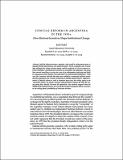|
Reseña:
|
Judicial reform presents a paradox: why would a ruling party agree to judicial reforms that limit its own political power? In the Argentine case, I argue that although the ruling Peronist party could be induced in 1994 to initiate re- forms (introduce constitutional revisions to strengthen the judiciary), the party then proved unwilling to accept the costs of an independent judiciary and failed to implement these changes (via enactment of congressional legislation). Only once the Peronists believed that they were unlikely to maintain political power did they implement the revised constitution’s judicial advancements. Implemen- tation of judicial reform in such a situation may serve the ruling party as an “insurance policy” in which a stronger judicial branch reduces the risks the rul- ing party faces should it become the opposition. My research suggests that the likelihood of implementation, the crucial determinant of judicial reform, increases as the ruling party’s probability of reelection declines. |

